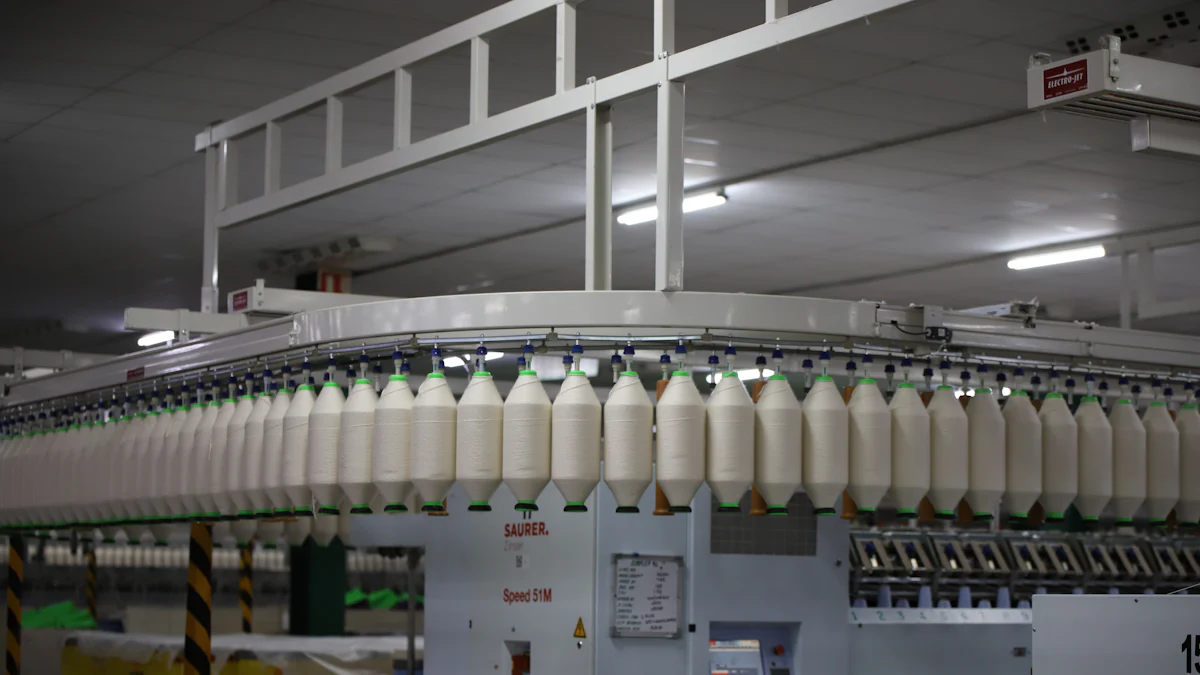Understanding the Importance of Ethical Production Practices

In today's world, the importance of ethics in business cannot be overstated. Ethical production practices stand at the forefront of this movement, ensuring that companies not only meet legal standards but also exceed them by embracing corporate social responsibility. You, as a consumer, play a pivotal role in this shift. Research shows that 83% of global respondents are willing to pay more for products they trust to be ethically sourced. This highlights the growing demand for ethical conduct in business operations. By adhering to ethical standards, companies not only enhance their reputation but also contribute to a sustainable future. Embracing ethical production is not just a choice; it's a necessity for long-term success.
Key Takeaways
Embrace transparency in your business operations to build trust with consumers and enhance your reputation.
Prioritize accountability by taking responsibility for your actions, which fosters integrity and strengthens consumer confidence.
Adopt sustainable practices to reduce your environmental impact and align with the values of consumers who prefer eco-friendly products.
Recognize that ethical production can lead to long-term financial benefits, including cost savings and increased customer loyalty.
Cultivate a positive workplace culture through ethical leadership, which inspires employees and boosts morale and productivity.
Engage stakeholders in your ethical initiatives to create a supportive network that reinforces your commitment to ethical practices.
Stay informed about the challenges of implementing ethical practices and develop strategies to overcome them for sustained success.
Key Principles of Ethical Production

In the realm of business ethics, understanding and implementing ethical principles is crucial for fostering trust and ensuring long-term success. As you delve into the world of ethical production, three key principles stand out: transparency, accountability, and sustainability. These principles not only guide businesses in their operations but also resonate with consumers who value ethical conduct.
Transparency
Transparency serves as the cornerstone of ethical production. When you engage with a company, you deserve to know how products are made and where materials come from. By being open and honest, businesses build trust with consumers. This trust is essential in today's digital age, where information is readily accessible. Companies that prioritize transparency often find themselves at the forefront of ethical sourcing. They openly share details about their supply chain operations, ensuring that you, as a consumer, can make informed choices. This level of openness reflects a commitment to ethical standards and enhances the company's reputation.
Accountability
Accountability is another vital aspect of ethical production. It involves taking responsibility for actions and decisions. When businesses hold themselves accountable, they demonstrate integrity and ethical conduct. This principle ensures that companies adhere to ethical standards and comply with all applicable laws and regulations. By doing so, they protect their reputation and foster a culture of trust. As a consumer, you can feel confident supporting businesses that prioritize accountability, knowing they are committed to ethical practices.
Sustainability
Sustainability is the third pillar of ethical production. It emphasizes the importance of creating products that do not harm the environment and contribute to a sustainable future. Businesses that embrace sustainability focus on reducing their carbon footprint and conserving resources. They understand that ethical principles extend beyond immediate profits and encompass long-term environmental stewardship. By supporting sustainable practices, you play a role in promoting a healthier planet. Companies that prioritize sustainability often find themselves aligned with consumers who value ethical production and are willing to support businesses that share their values.
Impact on Business Reputation
In the realm of business, maintaining a good reputation is paramount. Ethical production practices play a crucial role in shaping how consumers perceive your brand. When you prioritize ethical conduct, you not only adhere to business ethics but also build a foundation of trust and integrity. This commitment to ethical standards can significantly enhance your company's reputation, making it a preferred choice for consumers who value social responsibility.
Consumer Perception
Your reputation in the eyes of consumers hinges on their perception of your ethical values. Today, more than ever, consumers are keenly aware of the ethical implications of their purchasing decisions. They prefer to support companies that align with their values. In fact, a staggering 88% of global consumers express a preference for buying from companies with ethical sourcing structures. By demonstrating a commitment to ethical production, you can attract these discerning consumers and foster brand loyalty. This positive consumer perception not only boosts sales but also strengthens your brand's standing in the market.
Competitive Advantage
Embracing ethical practices gives you a competitive edge in the business world. Companies with strong ethical standards often outperform their competitors. Ethical businesses attract and retain investors, employees, and customers who value integrity. This alignment with ethical principles leads to a good reputation, which is invaluable in today's competitive landscape. Moreover, ethical companies have been shown to achieve similar or even higher profits compared to their peers. By prioritizing ethical conduct, you position your company as a leader in the industry, setting yourself apart from competitors who may not uphold the same standards.
Influence on Employee Behavior
Your workplace culture thrives when ethical leadership takes center stage. Leaders who embody ethical values inspire you and your colleagues to follow suit. This influence creates an environment where integrity and respect flourish. When you see leaders making decisions based on ethical standards, it encourages you to act with the same level of integrity. This positive behavior spreads throughout the organization, fostering a culture where everyone feels valued and motivated.
Workplace Culture
In a workplace where ethical leadership prevails, you experience a culture of trust and transparency. Leaders who prioritize ethical conduct set the tone for how you and your peers interact. This environment encourages open communication and collaboration. You feel empowered to share ideas and express concerns without fear of retribution. As a result, job satisfaction increases, and you become more engaged in your work. A strong ethical foundation in the workplace not only boosts morale but also enhances productivity and innovation.
Ethical Leadership
Ethical leadership plays a pivotal role in shaping your actions and attitudes at work. Leaders who demonstrate ethical behavior serve as role models, guiding you to align your actions with moral values. This alignment enhances your job satisfaction and work behavior. When leaders prioritize ethical decision-making, they create a transparent organizational structure. You gain clarity on expectations and feel confident in the fairness of processes. Ethical leadership taps into your values, motivating you to contribute positively to the organization's success.
"Ethical leadership positively influences employee job satisfaction, work behavior, and organizational transparency."
By embracing ethical leadership, organizations cultivate a workplace where you feel inspired and valued. This approach not only benefits you as an employee but also strengthens the organization's reputation and success.
Environmental Benefits

Embracing ethical production practices offers significant environmental benefits. By focusing on reducing your carbon footprint and conserving resources, you contribute to a healthier planet. These efforts not only align with ethical standards but also support the broader goal of environmental sustainability.
Reducing Carbon Footprint
Reducing your carbon footprint is a crucial step in promoting environmental sustainability. When you choose to minimize carbon emissions, you actively participate in the fight against climate change. Businesses that prioritize this reduction often find themselves saving money and attracting grants. By adopting energy-efficient practices and switching to renewable energy sources, you can decrease transportation costs and enhance your company's reputation. Consumers increasingly prefer companies that demonstrate a commitment to reducing their environmental impact. By aligning with these values, you not only meet consumer expectations but also position your business as a leader in ethical practices.
Resource Conservation
Resource conservation plays a vital role in achieving environmental sustainability. When you focus on conserving resources, you help create a sustainable future. Ethical businesses understand the importance of sourcing raw materials sustainably and minimizing waste. By implementing advanced recycling techniques and using biodegradable materials, you support a circular economy. This approach not only conserves resources but also reduces environmental degradation. Companies like Patagonia exemplify this commitment by conserving water, eliminating toxins, and reducing emissions. By following their lead, you can contribute to a healthier planet and inspire others to do the same.
"Supporting eco-friendly businesses helps decrease demand for products that contribute to environmental degradation."
By prioritizing resource conservation, you play an essential role in promoting ethical production practices. This commitment not only benefits the environment but also enhances your company's reputation and success.
Challenges in Implementing Ethical Practices
Implementing ethical practices in your business can be challenging, but overcoming these obstacles is essential for long-term success. As you strive to uphold ethical standards, you may encounter several hurdles that require careful consideration and strategic planning.
Cost Implications
One of the primary challenges you might face is the cost implications of adopting ethical practices. Initially, ethical production may seem more expensive due to the need for sustainable materials and fair labor practices. However, it's important to recognize that these upfront costs can lead to significant savings in the long run. Ethical sourcing practices, for example, could decrease supply chain costs by up to 16%. By investing in ethical production, you not only contribute to a better world but also position your business for financial success.
Consider the broader impact of ethical practices on your business. When you prioritize ethical standards, you reduce the risk of legal issues and reputational damage. This proactive approach can save you money on potential fines and lawsuits. Moreover, consumers are increasingly willing to pay more for products they trust to be ethically sourced. By aligning your business with these values, you can attract a loyal customer base willing to support your ethical endeavors.
Supply Chain Complexity
Navigating the complexities of the supply chain presents another challenge in implementing ethical practices. Ensuring that every link in your supply chain adheres to ethical standards requires diligence and transparency. You must work closely with suppliers to verify that they meet your ethical criteria. This process can be time-consuming and may require additional resources.
However, addressing supply chain complexity is crucial for maintaining your ethical commitments. By making ethical purchasing decisions, you help reduce supply chain risks such as forced labor, low safety standards, and poverty wages. This commitment not only protects your brand's reputation but also contributes to a more equitable and just global economy.
To overcome supply chain challenges, consider building strong relationships with suppliers who share your ethical values. Open communication and collaboration can help ensure that your entire supply chain aligns with your ethical standards. By fostering these partnerships, you create a network of like-minded businesses dedicated to ethical production.
"Ethical sourcing practices contribute to cost reduction in the supply chain."
By addressing these challenges head-on, you can successfully implement ethical practices in your business. Embrace the journey toward ethical production, knowing that your efforts will lead to a more sustainable and prosperous future.
Solutions and Best Practices
Incorporating ethical production practices into your business requires thoughtful planning and execution. By developing clear guidelines and engaging stakeholders, you can create a robust framework that supports ethical standards and drives positive change.
Developing Ethical Guidelines
Creating ethical guidelines is the first step in establishing a strong foundation for your business. These guidelines serve as a roadmap, outlining the principles and practices that align with your company's values. When you develop these guidelines, consider the following steps:
Identify Core Values: Determine the ethical values that are most important to your organization. These might include transparency, accountability, and sustainability. By clearly defining these values, you set the tone for your company's ethical culture.
Set Clear Expectations: Outline specific behaviors and practices that align with your ethical values. This clarity helps employees understand what is expected of them and how they can contribute to the company's ethical goals.
Provide Training and Resources: Equip your team with the knowledge and tools they need to uphold ethical standards. Regular training sessions and access to resources can empower employees to make ethical decisions in their daily work.
Monitor and Evaluate: Continuously assess the effectiveness of your ethical guidelines. Solicit feedback from employees and stakeholders to identify areas for improvement. This ongoing evaluation ensures that your guidelines remain relevant and impactful.
"Organizations and leaders have an ethical obligation to their stakeholders; they should not act out of self-interest, but instead should make decisions based on what is right." - Arnold (2017) and Brummer (2017)
By developing comprehensive ethical guidelines, you lay the groundwork for a culture of integrity and responsibility within your organization.
Engaging Stakeholders
Engaging stakeholders is crucial for the successful implementation of ethical practices. Stakeholders, including employees, customers, suppliers, and investors, play a vital role in shaping your company's ethical landscape. Here are some strategies to effectively engage them:
Open Communication: Foster an environment where stakeholders feel comfortable sharing their thoughts and concerns. Regular communication builds trust and encourages collaboration.
Involve Stakeholders in Decision-Making: Include stakeholders in discussions about ethical practices and policies. Their insights and perspectives can provide valuable input and help ensure that your ethical initiatives align with their expectations.
Demonstrate Commitment: Show stakeholders that you are serious about ethical practices by taking concrete actions. This might include implementing sustainable sourcing methods or improving labor conditions. Visible commitment reinforces your dedication to ethical standards.
Celebrate Successes: Recognize and celebrate achievements in ethical production. Highlighting successes not only boosts morale but also reinforces the importance of ethical practices to all stakeholders.
"Since ancient times, ethical leadership has considerably gained experts’ attention. At present, the accelerated progress of moral ethics has made the leaders develop a strong moral character, fundamentally contributing to the organization’s welfare."
By actively engaging stakeholders, you create a network of support that strengthens your company's ethical framework and enhances its reputation.
Ethical production is not just a trend; it's a vital component of modern business success. By embracing ethical practices, you contribute to a better world and achieve your business goals. Companies that prioritize ethical production enjoy numerous benefits, including enhanced reputation, increased consumer trust, and stronger financial performance. 88% of global consumers prefer buying from companies with ethical sourcing. This commitment fosters happier employees and loyal customers. Your ongoing dedication to ethical standards ensures continuous improvement and long-term success. Embrace ethical production as a pathway to a sustainable and prosperous future.
FAQ
What is ethical manufacturing?
Ethical manufacturing involves practices that prioritize reducing waste, ensuring fair labor conditions, and training staff effectively. It encompasses a wide range of activities aimed at creating a positive impact on society and the environment. By adopting ethical manufacturing, you contribute to a more sustainable and responsible business model.
Why should you care about ethical production?
You should care about ethical production because it aligns with your values and contributes to a better world. Ethical production ensures fair treatment of workers, reduces environmental harm, and promotes transparency. Supporting companies that prioritize ethical practices helps drive positive change and encourages more businesses to adopt similar standards.
How does ethical production benefit the environment?
Ethical production benefits the environment by reducing carbon emissions, conserving resources, and minimizing waste. Companies that focus on sustainability often implement energy-efficient practices and use renewable resources. By choosing products from these companies, you support efforts to protect the planet and promote environmental stewardship.
What challenges do businesses face in implementing ethical practices?
Businesses face challenges such as cost implications and supply chain complexity when implementing ethical practices. Initially, ethical production may seem more expensive due to sustainable materials and fair labor practices. However, these investments lead to long-term savings and a stronger reputation. Navigating supply chain complexities requires diligence and collaboration with suppliers to ensure ethical standards are met.
How can you identify companies with ethical production practices?
You can identify companies with ethical production practices by researching their sourcing methods, labor conditions, and environmental impact. Look for certifications such as Fair Trade or B Corp, which indicate a commitment to ethical standards. Additionally, companies that prioritize transparency often share detailed information about their production processes and supply chains.
What role do consumers play in promoting ethical production?
As a consumer, you play a crucial role in promoting ethical production by choosing to support companies that align with your values. Your purchasing decisions send a powerful message to businesses, encouraging them to adopt ethical practices. By demanding transparency and accountability, you help drive positive change in the industry.
How does ethical production impact business reputation?
Ethical production positively impacts business reputation by building trust with consumers and enhancing brand loyalty. Companies that prioritize ethical practices often enjoy a competitive advantage, attracting customers who value integrity and social responsibility. A strong reputation for ethical conduct can lead to increased sales and long-term success.
What are some examples of ethical production practices?
Examples of ethical production practices include using sustainable materials, ensuring fair wages and safe working conditions, and reducing environmental impact. Companies like Patagonia and TOMS exemplify these practices by prioritizing resource conservation and supporting community initiatives. By following their lead, businesses can create a positive impact on society and the environment.
How can businesses overcome the cost challenges of ethical production?
Businesses can overcome the cost challenges of ethical production by focusing on long-term benefits and strategic planning. Investing in sustainable materials and fair labor practices may have upfront costs, but these investments lead to savings through reduced legal risks and enhanced brand reputation. Additionally, consumers are often willing to pay more for ethically sourced products, providing a financial incentive for businesses to adopt ethical practices.
What steps can you take to support ethical production?
To support ethical production, you can start by researching and purchasing from companies that prioritize ethical practices. Advocate for transparency and accountability by asking questions about sourcing and labor conditions. Share information about ethical brands with your network to raise awareness and encourage others to make informed choices. By taking these steps, you contribute to a more sustainable and responsible future.